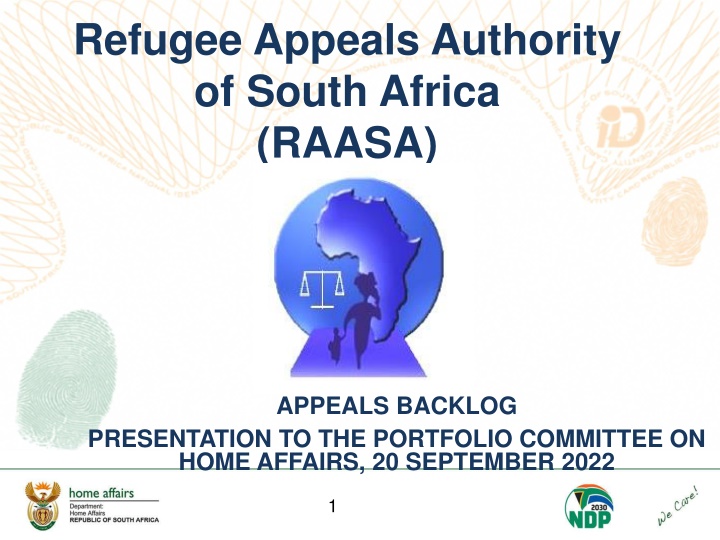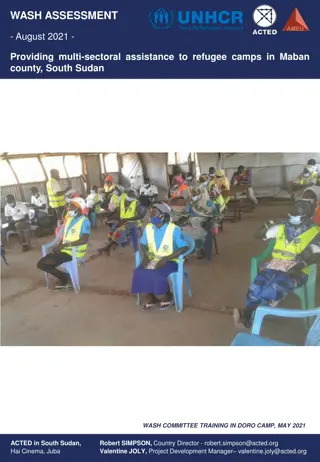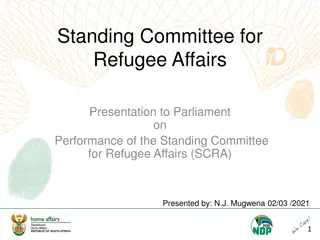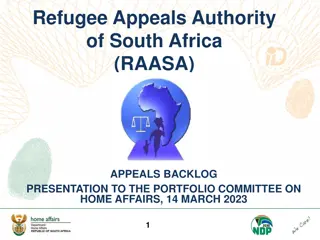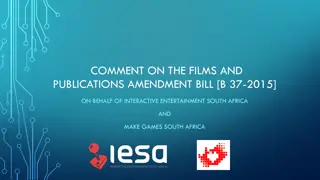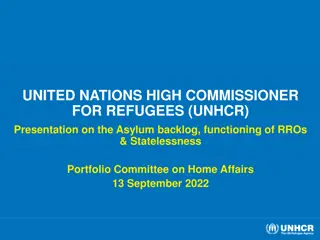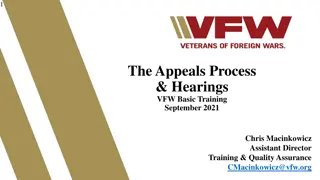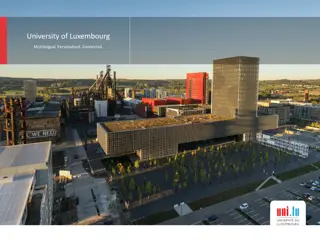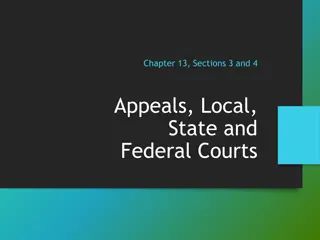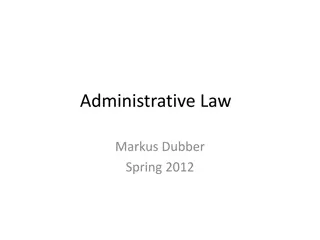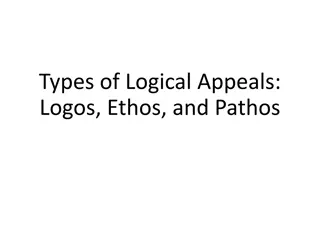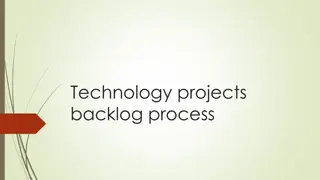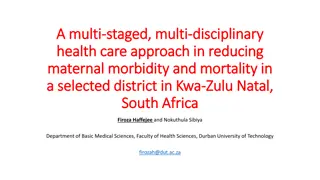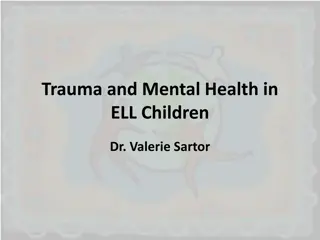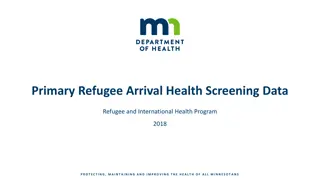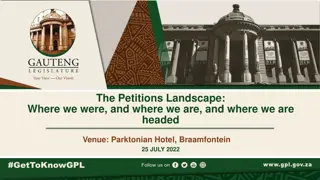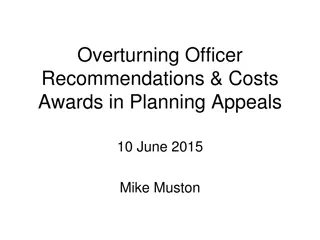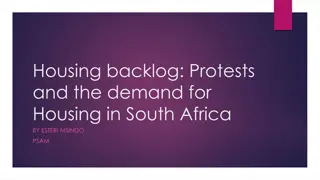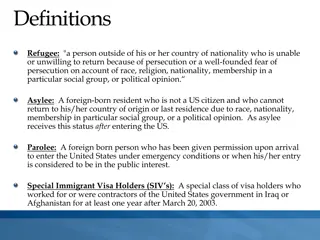Addressing the Refugee Appeals Backlog in South Africa
The Refugee Appeals Authority of South Africa (RAASA) faces a backlog of appeals due to various reasons, including an influx of asylum seekers in 2009 and challenges with economic migrants. The introduction outlines the establishment and mandate of RAASA, highlighting efforts to address the backlog through cooperation with the Department of Home Affairs and the UNHCR. The project background explains a partnership agreement aimed at eradicating appeal case backlogs and preventing future occurrences.
Download Presentation

Please find below an Image/Link to download the presentation.
The content on the website is provided AS IS for your information and personal use only. It may not be sold, licensed, or shared on other websites without obtaining consent from the author.If you encounter any issues during the download, it is possible that the publisher has removed the file from their server.
You are allowed to download the files provided on this website for personal or commercial use, subject to the condition that they are used lawfully. All files are the property of their respective owners.
The content on the website is provided AS IS for your information and personal use only. It may not be sold, licensed, or shared on other websites without obtaining consent from the author.
E N D
Presentation Transcript
Refugee Appeals Authority of South Africa (RAASA) APPEALS BACKLOG PRESENTATION TO THE PORTFOLIO COMMITTEE ON HOME AFFAIRS, 20 SEPTEMBER 2022 1
CONTENT PAGE Appeal Backlog Opening of RRO s Statelessness 2
INTRODUCTION The Refugee Appeals Authority of South Africa (RAASA) is an independent statutory body established in terms of section 8(A)(1) of the Refugees Act (No 130 of 1998 as amended). The primary mandate of RAASA is to consider all the appeals made against the decisions of the Refugee Status Determination Officers (RSDO). Upon receipt of an application by an asylum seeker and conclusion of the hearing by the RSDO, the RSDO must either: grant asylum, reject the application as manifestly unfounded, abusive or fraudulent or unfounded. Manifestly unfounded and abusive or fraudulent claims are reviewed by the Standing Committee on Refugee Affairs (SCRA) Unfounded claims are appealed at RAASA 3
INTRODUCTION The year 2009 signifies the highest peak of influx of asylum seekers into South Africa. This influx was due to the 2008 economic meltdown which many countries experienced. South Africa also experienced a recession, but in our region Zimbabwe was the hardest hit with a near economic collapse. For the first time, South Africa received asylum seekers in such numbers that the system could not keep up with the demand. Similarly, the Refugee Appeal Board (RAB), as it then was, was subjected to unprecedented numbers of failed asylum seekers emanating from RSDO decisions which led to the backlog. The following are two main contributors of the backlog: The then Refugees Act ( the quorum constitution of the RAB), which led to the Western Cape High Court decision of Harerimana v Chairperson of the Refugee Appeal Board and Others. The high inflow of economic migrants. 4
INTRODUCTION This backlog is not as a result of capacity constraints and incompetence of RAASA contrary to the popular saying. Every failed asylum seeker appeal their rejection outcome because the system allow. Currently, there is no legislation dealing with economic migrants and as such their significant numbers create a further bottle neck for appeals adjudication. The legislature created an unending bureaucratic ladder of appeal / review processes which are highly abused by failed asylum seekers and their legal representatives. Further, the International Treaties and Conventions on asylum seekers and refugees does not have legislation to deal with economic migrants either. In the absence of a Legislative Framework for economic migrants, they are similarly dealt with under the Refugees Act creating a further bottleneck. 5
BACKLOG PROJECT BACKGROUND In view of the rising number of appeals against RSDO decisions which are the current appeal backlog at RAASA, and taking into account the previous discussion, the Department of Home Affairs (DHA) and the UNHCR entered into an agreement of cooperation aimed at eradicating the backlog of appeal cases and to prevent similar backlogs from recurring through the provision of capacity support to RAASA. The DHA signed a Project Partnership Agreement (PPA) with the UNHCR on the 8th of March 2021. The signing of the partnership agreement paved the way for the implementation of Plan 2019. The total cost of the 4-year implementation plan with 36 Members is R146, 784,364 million. 6
BACKLOG PROJECT BACKGROUND The Backlog Project was conceptualized in 2019 through the development of a Project and Implementation Plan. The 2019 Plan sets out the objectives of the Project as well as the adjudication strategy based on the assumption that certain conditions will obtain such as amendments to the legislation to allow RAASA members to consider appeal cases individually as opposed to a panel (The Harerimana decision). Plan 2019 stands as the ultimate roadmap to guide the implementation of the Backlog Project and conceptualizes the adjudication strategy. According to Plan 2019, the project was to be implemented in phases. 7
PROJECT SCOPE The Project scope was defined in the 2019 Project Plan which sets out the various aspects of the Project to come to an efficient, cost effective and fair decisions. According to the National Immigration Information System (NIIS) the total current caseload (as at the beginning of the Project) is 133 582 cases and that constitutes the total number of all cases forming the backlog. These cases are divided into three main categories; Heritage Files (2011 and prior), Mid-RangeFiles (between Jan. 2012 to Dec. 2016) and Current Files (from 2017 to October 2021). 8
PROJECT SCOPE Following the appointment of Members and their training, statistics were drawn out from NIIS with the view to lock the numbers to define the scope of the project. The table below provides the breakdown of backlog cases per a Refugee Reception Office (RRO). Table A: Snapshot from NIIS of Backlog Statistics All Files Cape Town 2176 16502 Durban Musina Gqeberha Desmond Total Tutu 1231 34532 30501 66264 Current Heritage Mid-range7156 Total Source: NIIS 4223 10197 12645 27065 5512 2379 3650 11541 153 2693 32 2878 13295 66303 53984 133582 25834 9
POPULATION MATRIX Population Planning Group: Asylum seekers in South Africa on Appeal Sub-group (if applicable): Male in numbers Female in numbers Total in numbers in % in % in % Age Group 86 0,08% 0-4 87 0,33% 173 0,13% 2728 2,55% 5-17 2898 10,90% 5626 4,21% 103719 96,93% 18-59 23358 87,87% 127077 95,13% 467 0,44% 60 and > 239 0,90% 706 0,53% 107000 100,00% Total: 26582 100,00% 133582 100% Major Sites: While new asylum applications in South Africa continues to drop (from 35,378 in 2016 to 26,453 in 2019), as of April 2021, 133 582 asylum seekers were still awaiting the processing of their appeal applications. All the Regions (Pretoria, Durban, Gqeberha, Cape Town and Musina) 10
TRAINING OF MEMBERS Members have undergone training in various aspects of Refugee Law in particular on topics pertinent to the role that Members will be performing, namely, determining refugee appeals. Topics covered included amongst others: o Refugee Status Determination, o Establishing the facts and Credibility, o Country of Origin Information (COI), o Administrative and Constitutional Law, o Judicial Reviews, o Immigration and Detention of illegal foreigners, o Claims relating to children and vulnerable persons, o Claims relating to Sexual Orientation and Gender Identification (SOGI); o Appeals procedure and processes, as well as interviewing skills. 11
TRAINING OF MEMBERS (Cont.) RAASA and the UNHCR collaborated on identifying suitable topics to ensure that all new Members are appropriately equipped to adjudicate and finalize on all cases in accordance with the best practices. More training of Members is forthcoming on 19-21 September 2022, from the Judicial Institute for Africa (JIFA) relating to Administrative and Constitutional law, Judicial Reviews as well as Decision Writing. RAASA has also extended an invite to the South African Judicial Education Institute (SAJEI) through the Judge President of Gauteng Division of the High Court who also sits as the President of the International Association of Refugee and Migration Judges (IARMJ), to offer training to its Members. RAASA s request was received with warm hands. 12
RECRUITMENT AND APPOINTMENT OF MEMBERS The first group of members came on board in June 2021, the second group joined in July whilst the last group came on board in August 2021 to bring together a total of 31 members of the envisaged 36. Out of the 31 members, five members have since resigned between the period 01 January 2022 and August 2022. As things stand, we currently have 26 members. The process for recruitment of the 10 outstanding members has commenced and shortlisting of suitable candidates is scheduled for 23 September 2022.This will increase the capacity from 26 to 36 members. 13
CAPACITATION OF RAASA There are also permanent appointments for RAASA HO. These include the Office Manager position who started in January 2022 and three Appeal Clerks who started in December 2021 and January 2022. Pending processes include the crucial appointments of a Researcher, who will be responsible for research and assisting Members in all the Regions, and the appointment of two Refugee Appeal Officers or Case Workers to assist the Members administratively. In the forth coming weeks, we expect to recruit a Project Manager as the previous incumbent has resigned to pursue other career interests. 14
CAPACITATION OF RAASA (Cont.) RAASA has received nine (9) graduates who have been appointed as graduate learners to support RAASA. All the graduate learners are based in the Gauteng Province and designated at RAASA Head Office and Desmond Tutu RRO. Out of nine graduate learners three have since resigned to pursue other career interests. RAASA has now received 12 interns from SASSETA, the majority of which are LLB graduates, and are based in all the Regions (2 interns per Region). The interns will assist members with their day to day administrative work to fast track the hearing and finalization of the appeals. 15
COMMUNICATIONS AND OUTREACH Development of materials in various languages is vital to explain the appeal process to asylum seekers. The materials may be available through various modalities including hard copy pamphlets, webpage, WhatsApp, Twitter or other forms of social media. IT tools, such as an online Notice of Appeal, together with the development of RAASA s Website will assist to enhance RAASA s accessibility. Regular outreach to asylum seekers to inform them of the appeal process and their responsibilities will ensure that oral hearings proceed steadily and the Appellants are prepared. Regular stakeholder interaction is crucial to keep the communities informed about activities at the RAASA. 16
COMMUNICATIONS AND OUTREACH (Cont.) RAASA has developed a Brochure and a Factsheet which we are currently distributing to asylum seekers, Regional Offices, NGOs and other stakeholders. A stakeholder engagement was held in February 2022 to introduce the Project and inform the refugee community of their expected role and need for cooperation for smooth running of the Project. Following that, another stakeholder engagement was held in May 2022. More of these engagements are on the pipeline as information sharing exercises. These platforms for information can reduce the numerous inquiries that the RAASA receives on a daily basis. An email for enquiries does exist enquiries.rab@dha.gov.za and is managed by the Office Manager to ensure that all enquiries are dealt with and recorded. 17
ADJUDICATION STRATEGY The adjudicative strategy includes tools such as file streaming and strategic Member assignment (e.g. assigning certain countries to certain members). Effective streaming results in increased productivity and consistency in making decisions. A strategic approach to case processing requires streaming cases into categories that are adapted to the needs of the operation, that maintains both efficiency and quality decision-making. This strategy preserves the integrity of decision-maker s independence, which is a hallmark of any administrative tribunal. The Adjudication strategy divides the backlog of files into three categories: Heritage, Mid-Range and Current appeals. It is also within the mandate of RAASA to make paper determinations as an adjudication strategy. 18
BACKLOG PROJECT PROGRESS TO DATE As of 2021, RAASA began allocating files to Members for streaming and recommendation of appropriate adjudication approach towards the finalization of each case. It must be noted that the hearings only commenced from 6 December 2021 as RAASA Rules require that Appellants be given a notice of 30 days to prepare for hearings in terms of its Rules. At this stage Statistical Reports include weekly dashboards to track productivity. Case Management System has been developed. 19
BACKLOG PROJECT STATISTICS TO DATE The table below provides a summary of statistical information in relation to the number of cases streamlined by Members, hearings scheduled as well as the number of hearings conducted to date. Description HQ DT CT DBN PE MU TOT Cases requested from Centres 14721 2672 8875 327 3381 29976 Scanned online from RRO's 4511 978 2488 1019 2822 11818 Cases scanned at RAASA HQ 832 96 223 236 31 1418 Cases allocated for review 708 1174 489 366 197 1026 3960 Hearings scheduled 516 712 320 317 86 613 2564 Notices for paper determinations 5 69 0 9 31 39 153 Notices for No show - paper determinations 0 0 0 11 0 0 11 Description HQ DT CT DBN PE MU TOT Reviewed & profiled 624 992 340 313 272 876 3417 Hearings conducted 78 77 71 46 28 64 364 Decisions finalized 81 60 2 7 7 38 195 Paper determinations finalised 72 83 0 1 13 2 171 No Show decisions finalised 5 1 0 0 2 0 8 Section 3 C decisions on paper No show cases blocked on NIIS 87 1 0 0 3 0 91 133 245 26 21 17 73 515 20
BACKLOG PROJECT STATISTICS TO DATE The table below provides a summary of statistical information in relation to the number of current backlog cases. Cape Town Durban Musina Gqeberha Desmond Tutu Grand Total Current (as at 13 October 2021) 2176 4223 5512 153 1231 13295 Current (05 September 2022) 2164 4174 5467 150 1210 13165 Heritage Files (as at 13 October 2021) 16502 10197 2379 2693 34532 66303 Heritage Files (05 September 2022) 16428 9984 2290 2603 33874 65179 Mid-Range Files (as at 13 October 2021) 7156 12645 3650 32 30501 53984 Mid-Range Files (05 September 2022) 7107 12440 3571 31 29697 52846 Grand Total (as at 13 October 2021) 25834 27065 11541 2878 66264 133582 Grand Total (05 September 2022) 25699 26598 11328 2784 64781 131190 21
INTERVENTIONS TO REDUCE THE BACKLOG The purpose of the Backlog Project is to finalize the backlog inventory and put measures in place to prevent similar backlogs from occurring in the future. Adjudication leading to finalization of appeals is RAASA s primary mandate. It is also in keeping with the Department of Home Affairs (DHA) mandate to manage international migration efficiently and securely in the social, economic and cultural interests of all citizens and to manage asylum seekers who apply for refugee status; and to persons who have been granted status in accordance with the Refugees Act. 22
INTERVENTIONS TO REDUCE THE BACKLOG The processes that will be put in place for the backlog are also designed to serve the RAASA well going into the future. These plans include: o New legislation which was promulgated which allows single member hearings. This is projected to significantly impact on productivity. o Group decisions: The RAASA may make a ruling in terms of their Practice Note that would allow for two or more appeals to be determined together. This would be the position where; A similar question of law or fact arises. Asylum seekers are members of the same family. It is practical and efficient to proceed with more than one appeal. 23
INTERVENTIONS TO AVOID A NEW BACKLOG (cont.) o Adjudication of new appeals: Some members will be assigned to deal with the new incoming appeals to avoid recurring backlog once the Project Backlog has been finalised. Technology: A global reputation as an expeditious and cutting edge tribunal requires a flexible inventory. In order to achieve this, all files require digitalization which is the preferred solution for file and case management in a tribunal, particularly the size of RAASA s. Paper based decisions can be made by any member regardless of the location of the member or the file. To date RAASA has 11 818 appeal files digitalized. 24
INTERVENTIONS TO AVOID A NEW BACKLOG (cont.) When it comes to decision writing, e-files allow for writing efficiently in almost any location as long as a member has a laptop to work from. A live online system is underway, which will be able to track productivity of the adjudication process, automatically update statistics, and monitor overall performance across all Regions. 25
RECOMMENDATION It is recommended that the Portfolio Committee for Home Affairs note the presentation on the RAASA Backlog Project. 26
THE END 27
